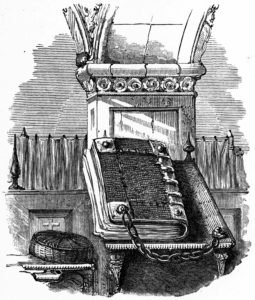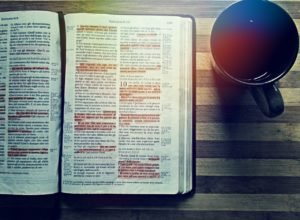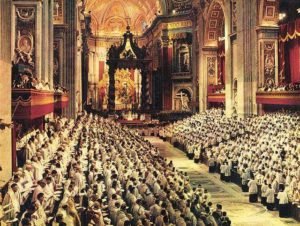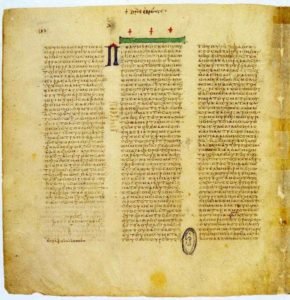 A claim that I’ve often heard made by anti-Catholics is that “Catholics cannot intepret Scripture for themselves, but must submit to the Catholic magisterium.” The claim is that the Catholic faithful cannot, are not able, or especially are not allowed to read and interpret the Bible for themselves, but are bound and constrained in every way to submit to the magisterium of the Church, to give up their very free will and intellectual judgment — in other words, that “the Bible is still chained,” that Catholics do not enjoy the freedom that Protestants have in “sola scriptura” to read, interpret, believe, and base their faith on the Word of God contained in the written word of Scripture.
A claim that I’ve often heard made by anti-Catholics is that “Catholics cannot intepret Scripture for themselves, but must submit to the Catholic magisterium.” The claim is that the Catholic faithful cannot, are not able, or especially are not allowed to read and interpret the Bible for themselves, but are bound and constrained in every way to submit to the magisterium of the Church, to give up their very free will and intellectual judgment — in other words, that “the Bible is still chained,” that Catholics do not enjoy the freedom that Protestants have in “sola scriptura” to read, interpret, believe, and base their faith on the Word of God contained in the written word of Scripture.
I’ve particularly heard this claim made by “former Catholics” who claim to be in the know, and it is usually presented with authoritative quotations from the teachings of various Church councils or statements of theologians, that appear, taken out of context and without a proper understanding of technical terms and distinctions, to forbid Catholics from reading and benefiting from Scripture on their own. This claim is specious and empty.

As I have written before, this claim, in substance, is the very same as the chief objection I myself had to the Catholic Church when I was a Protestant: that Catholics could not read and interpret Scripture for themselves, but must submit their understanding of Scripture to the magisterium of the Church. As a Protestant, I felt a closely-held prerogative to interpret Scripture for myself, in order to discern against false doctrines and false teachers, and even more, to engage in an intellectual communion with the Holy Spirit, the true interpreter of Scripture, through which God could lead me and guide me to the truth of His will, not only in matters of doctrine but in my everyday life. When I first heard the claims of the Catholic Church, that “the sole authentic interpreter of Scripture is the magisterium of the Church,” I felt viscerally threatened, that the Catholic Church sought to strip away and deprive me of my freedom as a Christian and a vital part of my relationship with God.
When I finally was faced with the truth of the Catholic Church, this was the first of my objections to fall. How that happened is a story I have told before. This post specifically examines the claim itself and the sources used to support it, why it is misleading, and why it is ultimately untrue.
The “Sole Authentic Interpreter”

The task of authentically interpreting the Word of God, whether written or handed on, has been entrusted exclusively to the living magisterium of the Church, whose authority is exercised in the name of Jesus Christ (Second Vatican Council, Dogmatic Constitution on Divine Revelation Dei Verbum [November 18, 1965] 10.2).
The most threatening word of this statement is exclusively: all others, presumably, are excluded from the task of interpreting, including, naturally, lay Catholics.
But who or what is the magisterium? The Catechism at CCC 85 offers a slightly different translation of the statement, and includes by way of explanation:
“The task of giving an authentic interpretation of the Word of God, whether in its written form or in the form of Tradition, has been entrusted to the living teaching office of the Church alone. Its authority in this matter is exercised in the name of Jesus Christ” (DV 10 § 2). This means that the task of interpretation has been entrusted to the bishops in communion with the successor of Peter, the Bishop of Rome.
So it’s the pope and bishops who have taken away my right to interpret the Word of God! I found this, if possible, even more threatening.

But the operative word of the whole statement is authentic or authentically. To untrained ears, this may sound to be a mere synonym to truthfully, really, genuinely — that is to say, only the magisterium of the Church can offer a legitimate interpretation, and all others are necessarily illegitimate — but here, authentic is actually a technical term. It means that only the teachings of the magisterium can be held, in a legal, dogmatic sense, to be authenticated; only they can be held, in matters of dispute, to be an absolutely verified and authoritative statement.
This does not, in any way, bar anyone, Catholics or Protestants or secular scholars, from interpreting Scripture on their own, or from those interpretations being legitimate or true. The very text from which this quote is taken goes on demonstrate otherwise.
All Catholics are Taught and Exhorted to Read and Interpret Scripture

The interpreter of Sacred Scripture, in order to see clearly what God wanted to communicate to us, should carefully investigate what meaning the sacred writers really intended, and what God wanted to manifest by means of their words. … But, since Holy Scripture must be read and interpreted in the sacred Spirit in which it was written, no less serious attention must be given to the content and unity of the whole of Scripture if the meaning of the sacred texts is to be correctly worked out. (Dei Verbum 11, 12, cf. CCC 109-114).
These words are written not to the pope and bishops (the magisterium talking to itself?), but to all Christians. No Catholic is barred from reading or interpreting Scripture, but all Christians are encouraged and expected to:
“And such is the force and power of the Word of God that it can serve the Church as her support and vigor, and the children of the Church as strength for their faith, food for the soul, and a pure and lasting fount of spiritual life” (DV 21). Hence “access to Sacred Scripture ought to be open wide to the Christian faithful” (DV 22).
The Church “forcefully and specifically exhorts all the Christian faithful… to learn the surpassing knowledge of Jesus Christ, by frequent reading of the divine Scriptures. Ignorance of the Scriptures is ignorance of Christ” (DV 25).
(CCC 131, 133)

The fact that lay Catholics are able and encouraged to interpet Scripture, not only with the approval but with the praise of the Church, is plainly evident by the numerous Catholic books written by lay Catholics on Catholic biblical interpretation, commentary, theology, some of my favorite authors being Scott Hahn, one of the most respected biblical theologians in the Catholic Church today and a layperson, a convert from Presbyterianism; and Michael Barber and Brant Pitre, likewise eminent Catholic biblical scholars and professors and laypeople.
“Subject to the Judgment of the Church”

Yes, lay Catholics, and all Christians, can legitimately and even truly interpret Scripture on their own. Understanding Scripture correctly, of course, involves “carefully investigating the meaning,” considering the “content and unity of the whole of Scripture,” and all the rest — advice that even Protestant exegetes gladly accept and encourage. Even the Reformed Westminster Confession of Faith encourages, for example, the use of “ordinary means” in arriving at a sufficient understanding of Scripture (WCF 7).
But the section of Dei Verbum on interpretation, quoted above, includes the caveat:
For all of what has been said about the way of interpreting, Scripture is subject finally to the judgment of the Church, which carries out the divine commission and ministry of guarding and interpreting the Word of God (DV 12).
What does it mean for Scripture to be “subject finally to the judgment of the Church”? It means, basically, that in matters of dispute, there is a final arbiter of interpretation, the magisterium of the Church. It means that while for Protestants, there is ultimately no final authority higher than one’s individual intellect and conscience in personally interpreting Scripture, resulting in endless disputes over proper doctrine and eventually the fragmentation of churches and denominations, Catholics do have a final authority in interpreting Scripture, an authoritative answer to doctrinal disputes and questions. Protestants may reject the claims of the Catholic Church to have such an authority — and here is not the place to discuss these claims at length; I have written much about them elsewhere — but the fact is that scriptural interpretation being “subject to the judgment of the Church” does not mean that Catholics are forbidden to interpet Scripture for themselves, but merely that they have a teacher and guide in doing so.
Reading with the Magisterium
One argument I’ve heard before claims that any interpretation of Scripture by a Catholic layperson is by definition contrary to the Church — that because the magisterium claims the right of being “authentic interpreter,” the Catholic layperson has no rights to interpret Scripture for himself at all, but instead must punctiliously submit his every thought to the literal dictations of the magisterium — that there is supposedly a compendium of magisterial scriptural interpretations that every Catholic exegesis must be compared with and must agree with. In fact, no such compendium exists; the “authentic interpretations” of the magisterium are contained in Catholic doctrine itself, as taught by the ecumenical councils of the Church and by the popes.
Truthfully, these “authentic interpretations” of the magisterium speak specifically to only a subset of Scripture, specifically to those Scriptures that form the basis of doctrine taught by the Church and to those about which there has been substantial dispute. For all the rest of Scripture, the reader is left, allowed, and encouraged to read and interpret for himself, in accord with the mind and sense of the Church.
A Teacher, Not a Tyrant
The magisterium of the Church is a teacher, not a tyrant. That is in fact what magisterium means. The interpretations of the Scripture that the Church offers are not arbitrary dictations of doctrine, contrary to the word and sense of the text, but teachings supported by extensive scholarship both into the scriptural texts, and into the contexts in which they were written and received. They are upheld by the understandings and interpretations of the earliest Christians, demonstrated in the testimony of the Church Fathers. Nothing the Church teaches regarding Scripture is new or baseless, but all can be found, in one form or another, in the deposit of faith, the teaching received from Christ and the Apostles, from the very beginning.
To submit to the magisterium of the Church is not to give up one’s freedom as a Christian, but it is to embrace the humility of a student, to listen to the teachers whom Christ entrusted the authority to teach us (e.g. 1 Timothy 4:13, 5:17, Titus 2:1). We have perfect freedom, ability, and license to read and interpret Scripture for ourselves, so long as we do so in accord with the teachings of the Church. Truth be told, no person, Catholic, Protestant, or otherwise, is free from this constraint: being part of a communion of faith involves being “of the same mind and judgment” with those with which one is associated; if a Christian decides he has a different interpretation of Scripture than the teachings of his church, then he may choose to depart from that church. This is the very foundation of Protestantism and of denominationalism. Indeed, the only person who is truly “free” to read and interpret Scripture entirely on his own, apart from agreement with any other Christians, is the one who denies all fellowship with the Body of believers, and who is perhaps the founder of a new religion.
I think that one of the great weaknesses of the protestant church is that it has no one it can turn to for the one legitimate, authenticated understanding of Scripture. There are many!
That isn’t to say that we don’t look to others for help, because we do. No one actually lives out the precepts of Sola Scriptura. We look to Calvin or Arminius to provide the framework for which we understand everything. We look to our Theological schools of thought for the right way of interpreting tricky passages.
As a protestant myself, one of the things I find most appealing about the Catholic and Orthodox faith is that they do have a body that can decide, what is authentic and what isn’t.
Thanks for the comment, Jim! Yes, it’s true, some Protestants do respect the learning of prominent teachers or even hold that their Protestant or patristic forebears hold some sort of authority. But ultimately, I think from the very premise of sola scriptura (at least, as it’s commonly held in Evangelical traditions), there’s this common notion that “all I really need to understand Scripture is my own interpretation, and that if I disagree with somebody, even with my pastor or with Calvin or Luther or the Fathers, then I hold an equal right and authority to stand on it.
That’s probably more true in the looser, more localized traditions of Evangelicalism that I grew up in like Pentecostalism or Baptist churches, than in more traditional and organized traditions like the Presbyterian or Lutheran churches. Those latter churches do still have something beyond the local church that can exercise church authority in doctrine and discipline. In the former, you very quickly have splits of churches or even of whole denominations over fairly minor differences of interpretation.
The bottom line for me, is what is the model taught by Scripture? I don’t read Paul or anybody there encouraging believers to “interpret Scripture for yourself to learn the truth.” No, there’s a model of authoritative teaching throughout what we see of the New Testament Church: Jesus taught with authority (Matthew 7:29), the Apostles taught with authority (Acts 11:26, 2 Thes 2:15), and the leaders they appointed to follow them taught with the very same authority (1 Timothy 4:11, Titus 1:9). The notion of making “Scripture alone” the authority of the church is a concept entirely foreign to Scripture.
The peace and grace of the Lord be with you!
During my own conversion, it was interesting to compare what the Scripture itself says about these things. On the surface at least, Scripture speaks very positively of the church as being the pillar and foundation of the truth (1 Timothy 3:15) and speaks negatively about private interpretation (2 Peter 1:20). It’s obviously a bit more complicated than that, but it was strange to hear “Bible Christians” saying we don’t need a Church authority and we just need the Bible and it all left me thinking, “But the Bible itself sure seems to suggest the opposite.”
I read and understood your remarks above but I believe that the final say about interpretations of the bible are not with the reader, but with the Church. In some guesses I would go as far as to say a ‘personal’ interpretation of the bible could be considered heresy. “Heresy is any belief or theory that is strongly at variance with established beliefs or customs, in particular the accepted beliefs of a church or religious organization.[1] The term is usually used in reference to violations of important religious teachings, but is also used of views strongly opposed to any generally accepted ideas.[2] A heretic is a proponent of heresy.[1] ” That being said, I feel that what the church is really saying is, “Read and know your bible so as to understand the Church’s interpretation of the same.”
Hi. Thanks for the comment. It’s been a little while since I wrote this article, so let me refresh my memory. Sure, in issues of Christian doctrine, and passages of Scripture that have significant bearing on doctrine, it’s quite possible to have a divergent, heterodox, or even heretical view. That is why I generally think it’s not a very good idea to turn a new Christian loose with a Bible with no discipleship or guidance. Contrary to what many Evangelicals teach, the Bible really isn’t that self-explanatory or “perspicuous.” Christians’ reading of the Bible should be combined with good discipleship from a more experienced Christian or a teacher or spiritual advisor. Even most Evangelicals I know would agree with that. There is a way of reading the Bible and interpreting the Bible that is inline with the Catholic Church, just as there is a Baptist way of reading Scripture, and a Reformed way, and so on. And deviating from those interpretations could be considered heresy by any one of those groups.
My point in the article is that, contrary to charges I’ve heard from many, Catholic Christians are indeed able and even encouraged to read the Bible for themselves and use their own mind and judgment in reading and understanding. Yes, that reading should be guided by what the Church teaches — isn’t that true for any church? There is a great deal in the Bible — I would hazard to say 95% of Scripture — about which there is no Catholic teaching. Believers, even Catholic believers, are free and able to read, interpret, and understand those passages.
The peace of the Lord be with you.
“We have one God and one Mediator who is Christ our Lord.” When we ask Jesus to explain the Scriptures, we can be assured that He will. While I agree that biblical scholars who are educated in Greek and Hebrew languages are essential to point out the nuances and apparent contradictions, I still believe that the Holy Spirit can speak directly to each one of us to impart wisdom, guidance and understanding of the Scriptures.
Hi, thanks for the comment. Yes, the Holy Spirit can guide us in understanding the Scriptures, but generally, for most people, the Holy Spirit does not speak audibly or verbally as a human teacher would do. He guides us through our senses, thoughts, and perceptions; he guides what we read and what we think and understand about it. He doesn’t speak new or hidden knowledge to us (that’s Gnosticism), or guide us off into unique personal interpretations (that’s how you end up with thousands of disagreeing churches). And he can only use what we learn and know: He may guide us to new thoughts or understandings of what we read, but we first have to know how to read. Learning more about Scripture though language study, reading commentaries, participating in Bible studies, gives the Holy Spirit all the more to work with. I’ve heard many people use the Holy Spirit as an excuse for not studying, or worse, for not submitting to a church or pastor or teacher. God appointed pastors and teachers and the Church to guide us and shepherd us; we are not meant to be solo Christians. Though the Holy Spirit is with each of us individually, more often his guidance comes through the Body of Christ. The peace of the Lord be with you.